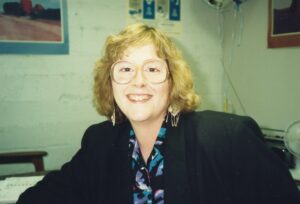
For fifty years, Evergreen Treatment Services has had the privilege of serving the greater Puget Sound community. Since first opening its doors in 1973, much has changed about ETS – including its name! But one thing has remained the same: we put the needs of those we serve first. For ETS, care is evergreen.
Carol Davidson, ETS’ most tenured staff, knows this firsthand. Starting as a full-time counselor in 1981, Carol is now our clinical care supervisor. She continues to provide person-centered care, mentor and train clinic staff, and advocate for compassionate recovery services that meet the changing health and personal needs of clients. She shares the lessons she’s learned throughout her time with ETS.
Donate to ETS to support our life-saving work.
I was 25 when I started working with Evergreen Treatment Services. I completed my master’s in social work from the University of Washington and had worked primarily in mental health before then. When I started as a full-time counselor, I typically provided services to a caseload of 75 to 85 patients. The agency served a little under 300 patients when I first started and continued to grow throughout my tenure. I transitioned into the role of treatment director after seven years where I had my first chance to do clinical supervision. Though I didn’t carry a caseload at first, I found that carrying a small caseload helped keep patient concerns fresh and helped me be a better mentor to my staff. Forty years later, ETS clinics serve more than 3,000 patients, and I am currently the primary supervisor of nine substance use disorder professionals/trainees and carry a caseload of ten patients.

In my years at ETS, I’ve been privileged to build lasting, therapeutic relationships with patients, and I’m quite proud of that! For example, one client has been in treatment since I started employment, and she was added to my caseload about 20 years ago. When we first met, she struggled with non-prescribed opiate medications, like Demerol or codeine, and heroin. She discontinued her use of heroin and other non-prescribed opiates shortly after she entered treatment—this was her choice; abstinence is not a requirement for receiving treatment at ETS because we know that doesn’t work for everyone. Since then, she has done extremely well in treatment and her opioid use disorder has been well managed. She has reported that the combination of her methadone medication—a medication that helps her feel physically stable without withdrawal symptoms—and her other supportive agency services, such as counseling, mental health follow-ups with our medical director, meeting with her agency medical provider and acupuncture services, has assisted her in having a stable, long-term recovery.
She’s in her late 70s now and is living with dementia. Despite the dementia, she still manages to come to the clinic on a regular basis and sees us as a supportive hub. We have adjusted to her needs over time. We work to connect her with resources and community-based care as she’s aged. Her involvement with us has been an important lifetime connection for her.
That’s really what our work is. It’s a lifetime of work. I think back to my mentor, Ron Jackson, our former executive director. He had a Nike poster of a runner on Green Lake in his office and it said, there is no finish line. I think that describes our work perfectly. Don’t get complacent, there is no finish line—we’re in this for the long haul, as are our patients. For many, treatment is a lifelong commitment. We do our best to make sure that we’re providing evidence-based services, and to do that we have to adjust. We have to meet people where they are.

That means we must change, too, especially if our practices are not serving the community. One big change we have made over the years is in our discharge policies. In the past, we had months-long waitlists for treatment, and we had to decide who to allow into treatment and who to discharge if there was lack of progress. At the time, we viewed attendance as a sign of progress because the longer and more consistent someone remained in treatment, the better their health outcomes. So, if someone missed four doses in a 60-day period that would lead to a team meeting. If they continued to have attendance problems, it could lead to an administrative taper, where a patient is slowly tapered off medication before being discharged from treatment. But now our policy is that if someone misses 30 consecutive days, they can be discharged, and they can reapply without a waiting period if they need to.
We recognize that we’re working with people who have many challenges with stability. Maybe they’re unhoused or are dealing with co-occurring health problems that make coming to the clinic six days a week a lot to ask. ETS works hard to adjust to people’s needs and to make our services as low-barrier as possible.
We also seek to empower our clients through education. The risks for people with opioid or other substance use disorders are compounding health related issues, like exposure to infections such as HIV and hepatitis C, and overdose. ETS has seen many public health emergencies that have affected our patients over the years. There was hepatitis C in the 70s and 80s, then cocaine became a major issue in the mid-80s, followed by the rise of methamphetamine and heroin potency and availability, and now we’re dealing with fentanyl.
I am very proud of the ways our agency prioritizes education with a focus on safety and harm reduction. We refer people to the needle exchange. If someone is unable to stop injecting, then we make sure they know where to get clean injection equipment, so they aren’t exposed to an infection that might stay with them the rest of their life. With fentanyl responsible for so many deaths by overdose, we try to get people to use test strips to test their drugs. We talk to our patients about the options they have to reduce their risk and protect their safety.
I’m proud of the work I’ve done and what ETS has become. I’ve always loved that we’re an interdisciplinary team with medical providers, counselors, peer counselors, case managers, our whole hospitality and engagement team, and we work with social workers to help connect patients to community resources. We have primary health care here at the clinic now in coordination with Harborview Adult Medicine Clinic providers. With the addition of REACH, our patients have great outreach support to assist in connecting them with needed resources to improve their health and stability. As our agency continues to grow and build new partnerships, I hope we remain flexible and responsive to the needs of our patients, especially as we follow them along their recovery journey.





Congratulations on 40 years of wonderful caregiving, Carol. What a gift you are!
Congratulations Carol on 40 years of service at ETS. You have played a major role in developing the agency into what it is today. I feel very fortunate to have had you as my practicum instructor during my first year in the UW’s MSW program and as my clinical supervisor during my many years on the ETS staff.
I enjoyed reading your blog. You are a inspiration to us all.
Carol is a wonderful colleague and model for how we all need to work with those we serve. Carol is an amazing problem solver and always seems to have good ideas for therapeutic interventions, especially with more challenging clinical situations. I seek her input often and value her competence and wisdom! She also has an amazing memory!!
Congratulations Carol on your milestone of 40 years of service to ETS! Your compassion and knowledge have guided ETS Staff for the benefit of ETS and patients! Your dedication to serving this population through many challenges, as noted in your blog, are a true testament to your career! It was a pleasure working with you at South Sound Clinic through it’s opening and first year. Sincere wishes for continued success!